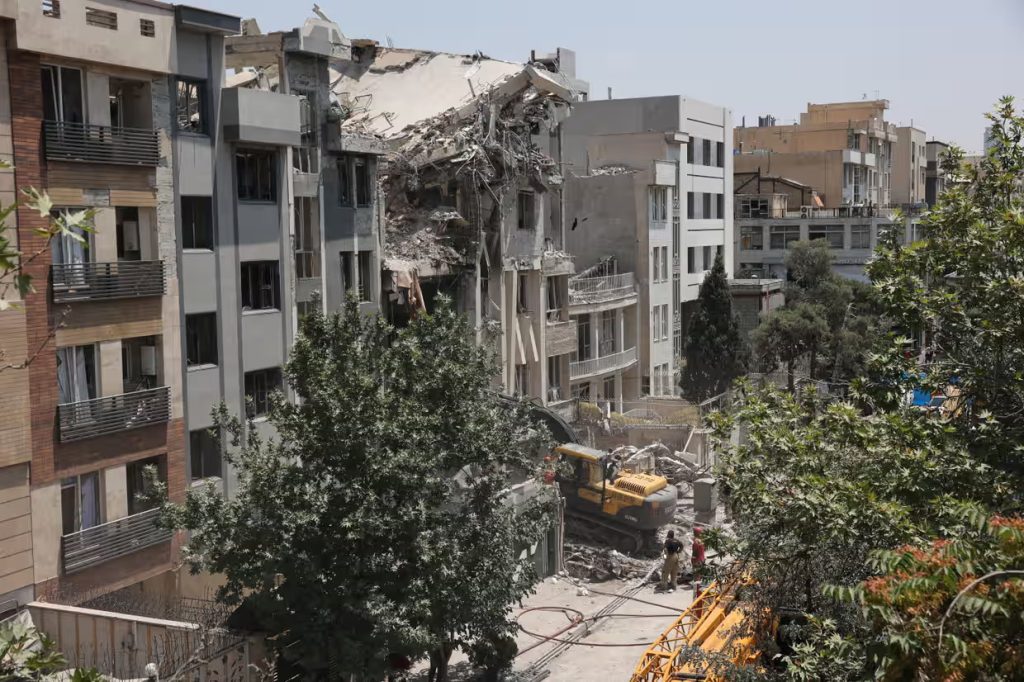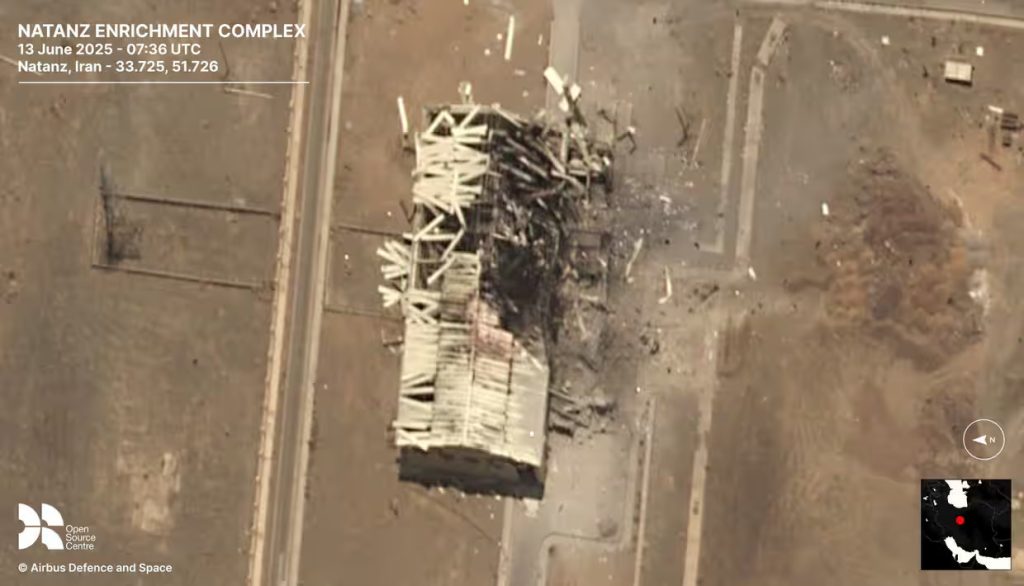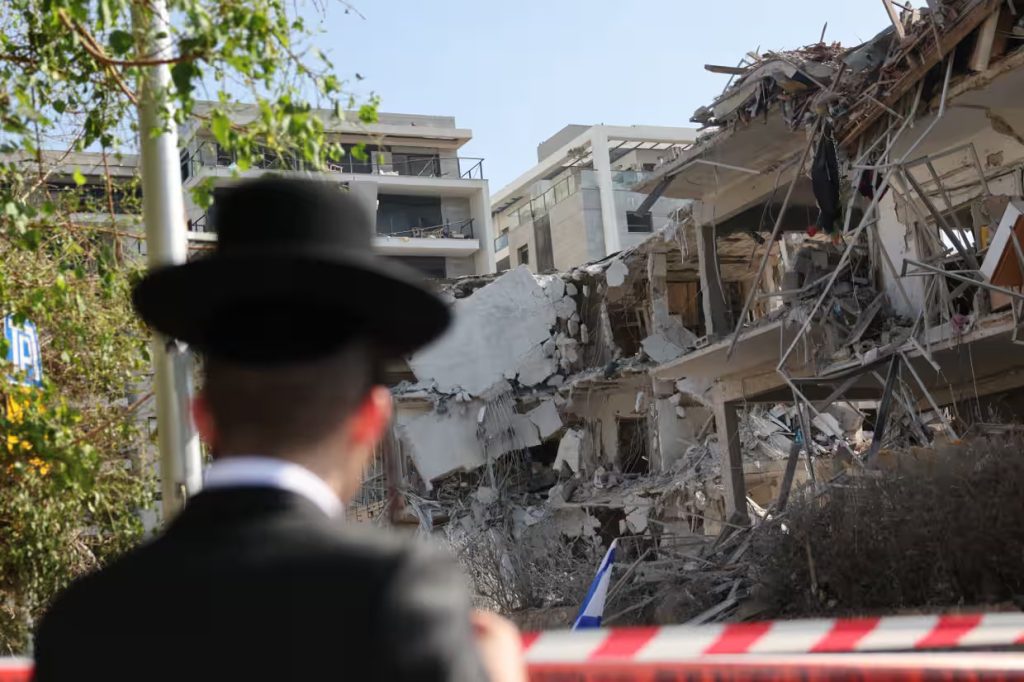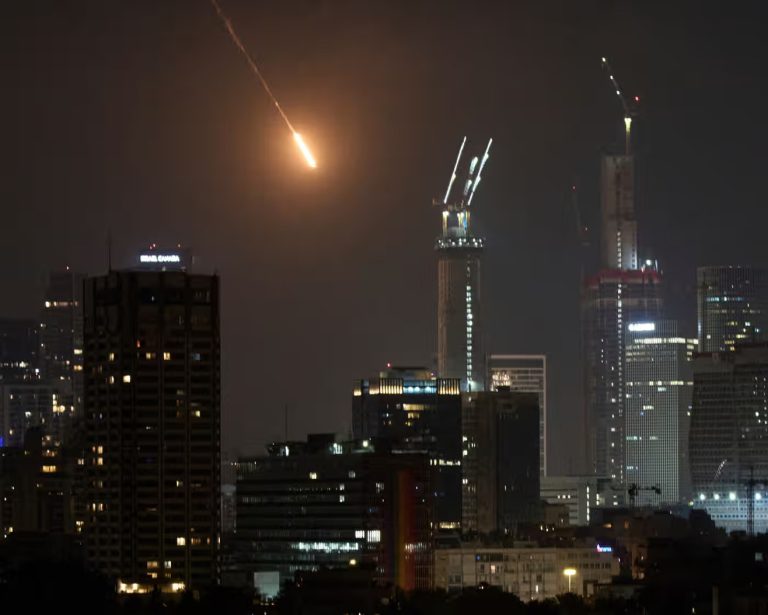Iran has issued a warning to the United States, the United Kingdom, and France, stating that their military bases and naval assets will be targeted if they intervene to block Tehran’s missile and drone strikes in retaliation for Israel’s recent attack. The threat raises the risk of escalating an already deadly conflict linked to Iran’s nuclear ambitions.
Former U.S. President Donald Trump has pledged support for Israel, while U.S. officials have confirmed that American forces have already assisted in intercepting Iranian missiles and drones aimed at Israeli territory. French President Emmanuel Macron announced on Friday that France would also help defend Israel against any Iranian retaliation. Meanwhile, the UK government has stated that its military has not provided assistance to Israel, with Prime Minister Keir Starmer emphasizing the need for de-escalation.
Iran’s threats appear aimed at deterring Western involvement in Israel’s defense, as most of Tehran’s projectiles have been intercepted before reaching their targets. However, carrying out such threats would represent a major escalation, potentially drawing Western forces directly into the conflict at a time when Iran is already under heavy bombardment from Israeli airstrikes.
During a United Nations Security Council meeting on Friday, U.S. diplomat McCoy Pitt warned, “No government, proxy, or independent actor should target American citizens, bases, or infrastructure in the region. The consequences for Iran would be dire.”
On Saturday, the conflict intensified as Israeli warplanes launched strikes on targets in Tehran, while Iran responded with waves of missiles and drones in the second day of aerial combat. Israel has signaled a determination to dismantle Iran’s nuclear capabilities, while Tehran has vowed to make Israel pay for its surprise offensive.

Iran launched a wave of retaliatory missile and drone strikes against Israel early Saturday, killing at least three people and injuring dozens more. In response, Israeli Defense Minister Yoav Gallant warned Iran’s Supreme Leader, Ayatollah Ali Khamenei, that “Tehran will burn” if attacks on Israeli civilians continue. The Israel Defense Forces (IDF) reported that dozens of its fighter jets struck targets in Tehran, focusing on air defense systems. Iranian state media confirmed that a fighter jet hangar at Tehran’s Mehrabad Airport had been hit, and state television reported that around 60 people—including 20 children—were killed in a strike on a residential complex in the capital.
At the UN Security Council on Friday, Iran’s ambassador, Amir Saeid Iravani, claimed that Israeli attacks had killed 78 people and wounded over 320, most of them civilians. Among the dead were reportedly several high-ranking Iranian generals and at least six nuclear scientists, caught off guard by the scale and intensity of the Israeli offensive.
Iran also acknowledged limited damage at its uranium enrichment facility at Fordow—one of two major nuclear sites struck by Israel. On Friday, the IDF stated it had inflicted “significant damage” on Iran’s Natanz facility. The International Atomic Energy Agency (IAEA) later confirmed that above-ground structures at Natanz were destroyed, though its underground facilities remained intact.
An IAEA assessment reported manageable levels of radiological and chemical contamination at Natanz, with no elevated radiation detected in surrounding areas. Iran also said its nuclear complex in Isfahan—which includes a uranium conversion plant and fuel production units—was targeted.
In a public statement, the IAEA reminded Israel that attacks on nuclear installations violate international law and the UN Charter, warning they carry the risk of “radioactive releases with grave consequences.”
Meanwhile, civilians in Tel Aviv and other parts of Israel took shelter during the early morning hours as new Iranian missile barrages approached. The IDF said it intercepted multiple drones over the Dead Sea. Air raid sirens later sounded in the West Bank and northern Israel, including areas near the Sea of Galilee.

The deadliest casualties from the incoming missile attacks occurred in the West Bank, where five Palestinians, including three children, were killed. According to the Palestinian Red Crescent, the strike was believed to have come from a projectile launched by Houthi forces in Yemen, allies of Iran. In the first 24 hours of the conflict, three Israelis were also killed—two in Rishon LeZion and one in nearby Tel Aviv—while dozens were injured and numerous buildings sustained serious damage.
Reports from Gaza indicated that Israeli forces had fired on large crowds of Palestinians attempting to reach food distribution points. However, details remained difficult to verify due to a communications blackout, now in its third day, following the reported severing of a key cable by Israeli forces.
Prior to Israel’s early Friday strikes on Iran, Iranian and U.S. diplomats had been scheduled to meet in Oman in an effort to restart negotiations over Iran’s nuclear program. Those talks have now been thrown into doubt. Iran’s foreign ministry spokesperson, Esmail Baghaei, said the discussions had “become meaningless,” though he stopped short of confirming their cancellation. The Mizan news agency, affiliated with Iran’s judiciary, quoted him as saying, “It is still not clear what we decide about Sunday’s talks.”
By Saturday morning, signs pointed to continued escalation. Israeli Prime Minister Benjamin Netanyahu vowed that more Israeli attacks were “on the way,” while Iran’s Supreme Leader, Ayatollah Ali Khamenei, promised that Israel would be brought to “ruin.” In a further sign of intensifying conflict, Mohammad Pakpour, newly appointed head of Iran’s Revolutionary Guards after his predecessor was killed in the Israeli assault, threatened to “open the gates of hell” in retaliation, raising fears of a full-scale regional war.
In Tel Aviv on Friday night, thick columns of smoke rose from one of the impact sites, darkening the skyline and obscuring the nearby high-rises. Fragments of intercepted missiles lit up the night sky as they broke apart overhead. One missile struck a residential tower in central Tel Aviv, shattering windows along much of its exterior and leaving parts of the structure exposed, with twisted steel bars protruding from the damaged facade.
Footage broadcast on Israeli television showed firefighters navigating piles of rubble at the building’s base, where the wreckage of a car lay crumpled from the blast.

Israel’s national ambulance service reported that 34 people were injured on Friday night in the Tel Aviv area, most of them suffering only minor wounds. Later, police confirmed one fatality. The following morning, two more people were killed in a direct missile strike on central Israel.
In response, Israel’s Defence Minister, Israel Katz, accused Iran of crossing significant boundaries by targeting civilian areas. He noted, however, that earlier in the day, Israeli strikes had also hit residential zones within Iranian cities.
Katz declared, “We will not stop defending Israeli citizens. The Ayatollah regime will pay a steep price for its brutal actions.”
Israel’s government and the Israel Defense Forces (IDF) maintained that their military operation, codenamed Rising Lion, would continue until Iran’s nuclear capabilities — which Prime Minister Netanyahu claimed were nearing weapons-grade — were completely dismantled.
“Our objective is to eliminate the threat,” said an IDF officer, “to ensure they cannot produce a nuclear bomb and to remove the existential danger to the Israeli people.”
At the United Nations Security Council, Rafael Grossi, the Director-General of the International Atomic Energy Agency (IAEA), voiced concern over the escalation, warning of dire consequences.
“Nuclear sites should never be targeted under any circumstances,” Grossi emphasized. “Such attacks endanger lives, the environment, and have serious implications for nuclear safety, security, and global stability.”
The United States’ involvement in Israel’s campaign remained somewhat unclear. Ahead of Israel’s large-scale airstrike involving 200 aircraft, former President Donald Trump had publicly encouraged a diplomatic approach, ahead of scheduled U.S.-Iran talks on Sunday. However, on Friday, he said he was fully briefed on Israel’s intentions and described the operation as “excellent.”
Pressed by The Wall Street Journal about how much notice the U.S. received, Trump replied sharply: “Heads-up? It wasn’t a heads-up. We knew what was happening.”
In a separate interview with ABC News, Trump praised the strikes, tying them to a 60-day deadline he had issued earlier in the year for Iran to come to the negotiating table. “We gave them a chance and they didn’t take it,” he said. “They got hit hard. As hard as you can get hit. And it’s not over. There’s a lot more coming.”
On his Truth Social platform, Trump warned Iran that unless it agreed to a deal, even harsher attacks were already planned.
ABC News also cited a source familiar with the situation, who said the U.S. had supplied “exquisite” intelligence to assist Israel and stood ready to help defend it if necessary.

